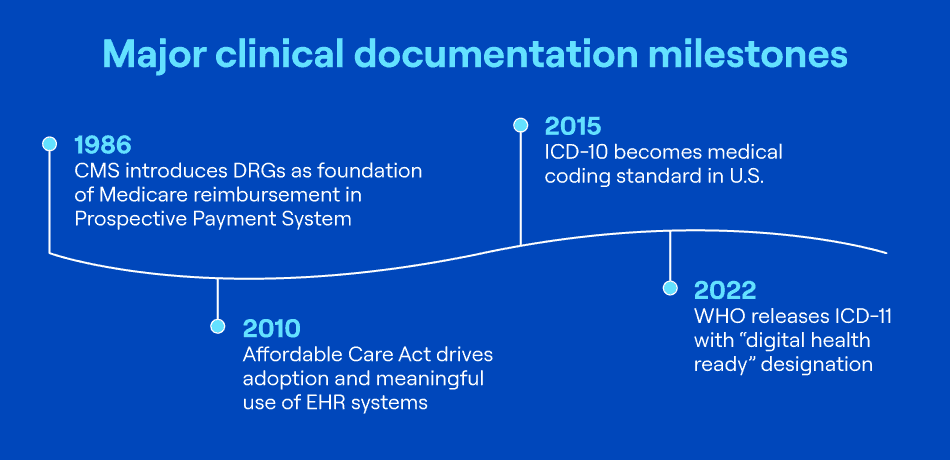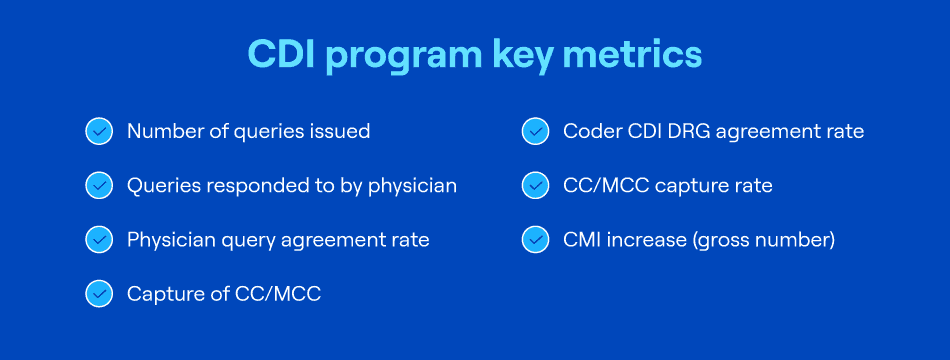Joint clinical documentation integrity solution bridges the gap between managed services and intelligent technology
The clinical documentation integrity (CDI) market is about to see something new and different – a CDI solution that combines the domain expertise and deep data insights of R1 RCM clinical documentation specialists with the Best in KLAS AwareCDI from Iodine Software. The joint venture bridges a gap in the CDI market that has previously been served by disparate approaches, with consulting and managed services on one hand and technology solutions on the other. Healthcare providers can now transform CDI by leveraging this new technology-enhanced service from R1 RCM, CDI Total Performance powered by Iodine, to improve the completeness, accuracy, and specificity of the medical record and reduce documentation, coding, and billing errors.
The need for a new CDI approach
Efforts to codify clinical care are as old as documentation itself, with the first “modern” disease classification system developed in the early 18th century. With quantum leaps in specificity and complexity of medical coding in recent times and the push toward value-based care, CDI becomes more important than ever as a driver of revenue performance today and tomorrow.

A national study of CDI leaders conducted last year by the Association of Clinical Documentation Integrity Specialists (ACDIS) for Iodine Software provides important insight into attitudes about CDI and what defines program success. That study found 91% of CDI leaders track financial impact as a measure of success, while 68% track severity of illness (SOI)/risk of mortality (ROM) impact, and 53% make note of the observed-to-expected mortality rate.
A strong CDI program is a critical imperative that comes with challenges
Released earlier this year, the 2023 Revenue Intelligence Data and Insights Report unveils some of the RCM issues most profoundly impacting healthcare providers. Of the 13 revenue cycle stages covered, seven have clinical documentation integrity as a key enabler for process and outcome improvement. From determining appropriate patient status and capturing legitimate charges to recovering underpayments and reversing denials, CDI plays a foundational role in facilitating and improving mid-cycle and back-end revenue processes.
There are several barriers that can hinder the effectiveness and sustainability of a CDI program. One is the industry perception of CDI programs as cost centers rather than revenue drivers. Providers that do recognize CDI’s revenue opportunities can struggle to make headway because their programs lack transparency, accountability, or focused leadership due to strained resources. Additionally, many providers are reluctant to make changes to their CDI programs because they worry about the potential for disrupting regulatory compliance. Other factors preventing CDI excellence include:
- Constant regulatory and coding changes
- Difficulty measuring program effectiveness
- Technology limitations and integration
- Inefficient and low-quality physician queries
Ideally, CDI programs should align with the Quadruple Aim. A key role for CDI leadership, then, is to determine program priorities considering the aim, anticipate the potential barriers to achieving documentation excellence, set the table for appropriate expectations, and ensure that CDI program performance is assessed on a rational basis.
Professional development drives CDI performance improvement
The strength of any quality CDI program is a well-trained and educated team. Unfortunately, with ongoing staffing shortages, budget constraints, and cost-cutting priorities, hospitals often struggle to make the investment necessary to see real improvement. Additionally, it can be difficult to quantify and therefore justify a return on investment from staff education and training.
R1 CDI engagements provide a caring, high-touch onboarding experience with new education and career development opportunities for the CDI team. These include monthly education sessions on clinical topics, quarterly coding clinics, regular quality audits of each CDI specialist and an annual review of Inpatient Prospective Payment System (IPPS) updates and rules. The model enables CDI teams to operate at top-of-license and just as important, reduces stressors that can lead to team and physician burnout.
Introducing a new kind of CDI partnership
R1 CDI Total Performance, powered by Iodine, brings to market a transformational solution built upon shared responsibility for collective CDI goals, deep clinical documentation expertise, and clinically intelligent technology. As an accountability partner, we invest in the success of our clients because our success depends on it. That begins with career growth for the team – we transform CDI programs with best practices education gleaned from CDI engagements with leading hospitals and health systems that open new professional opportunities for staff. Then we further empower that team with Best in KLAS clinically intelligent technology to drive measurably better results and revenue.
“We’ve been in this market a long time and know CDI is a big driver of success in our partnerships with leading hospitals and health systems,” said Kyle Hicok, Executive Vice President and Chief Commercial Officer at R1. “From our vantage point, we see an unsolved need for a more holistic approach to CDI and a real opportunity to innovate in this space. CDI Total Performance allows us to serve more hospitals and health systems wherever they are on the CDI journey and help them achieve documentation excellence that improves the quality of care and captures more earned revenue.”
“CDI Total Performance is a unique, comprehensive solution capable of delivering exceptional value to clients, said Troy Wasilefsky, chief revenue officer at Iodine Software. “Together, R1 and Iodine bring proven performance management prowess, documentation expertise and impactful technology to deliver the financial, quality and productivity gains demanded by health system executives at a speed that will set a new benchmark for industry expectations – right when health systems need it most.”
Achieve CDI excellence with best practices and Best in KLAS software
With more than 90 of the top 100 hospitals in the U.S. as customers, R1 is unique in its ability to develop, aggregate, and replicate CDI best practices at scale to improve clinical documentation performance. Iodine’s Best in KLAS AwareCDI technology provides new insight to CDI teams by strategically identifying and prioritizing cases for review and streamlining the query process to achieve higher response rates. Together, R1 and Iodine deliver the only offering of its kind on the market, the closest thing there is to an easy button to fast-track CDI excellence.
To learn more, visit the R1 CDI solutions page.




